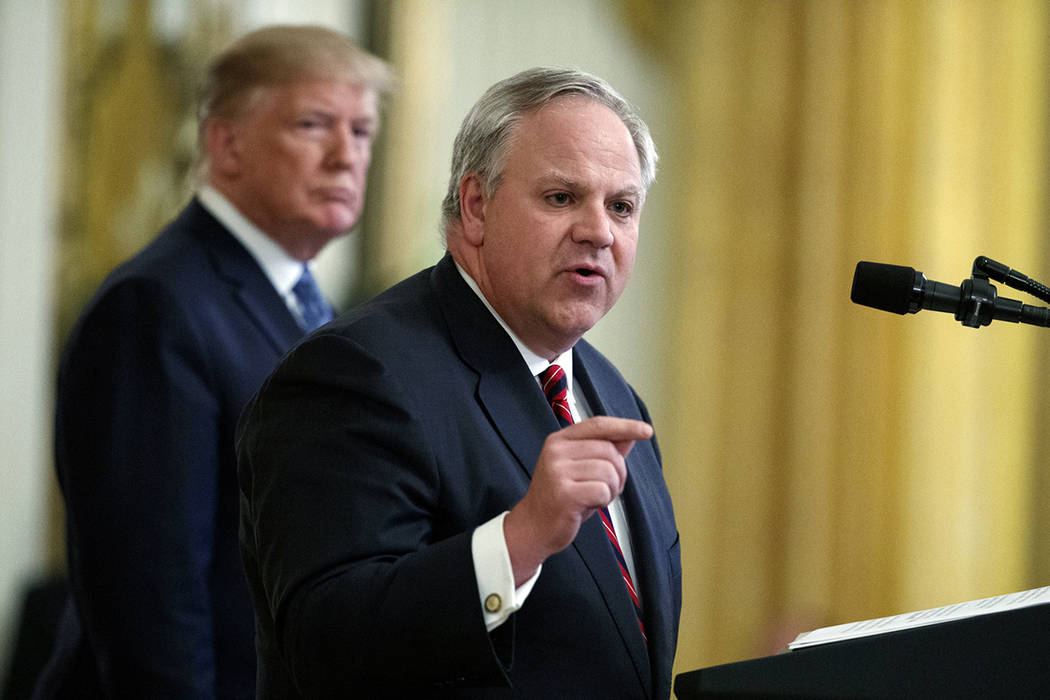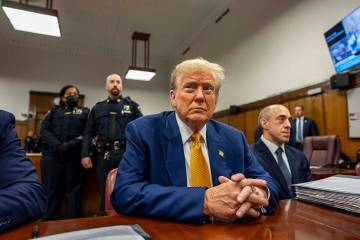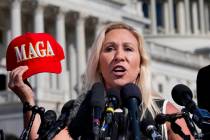Environmentalists sue over Endangered Species Act
WASHINGTON — Trump administration proposals by the Department of Interior to change endangered species rules, as well as a record of contacts by Secretary David Bernhardt with former clients, drew a flurry of lawsuits from environmental groups seeking wildlife protections and transparency.
The lawsuits, filed last week, put the Interior Department on the defensive as it moves to overhaul regulations.
The Trump administration said the rule changes to the Endangered Species Act would make the law more efficient, an argument disputed by environmental groups, which characterized the rollback as a giveaway to industries.
“Scientists around the world are sounding the alarm about extinction, but the Trump administration is removing safeguards for the nation’s endangered species,” said Noah Greenwald with the Center for Biological Diversity.
The changes would have an impact in Nevada.
“There are a number of species that would be impacted by the new regulations,” said Patrick Donnelly, the Center for Biological Diversity’s Nevada state director.
He listed the Dixie Valley toad, the Mojave Desert tortoise and the Las Vegas bearpoppy flower as just some local examples.
Eight conservation groups joined the lawsuit, filed in U.S. District Court in California, to block the Trump administration changes to the Endangered Species Act.
Second lawsuit filed
Meanwhile, a conservation group in Montana, the Western Values Project, filed a lawsuit in U.S. District Court for the District of Columbia seeking documents that show communication between Bernhardt and former clients, many of them energy companies.
That lawsuit was filed after the Interior Department failed to make the documents available through a Freedom of Information Act request.
“The public has a right to know if Secretary Bernhardt’s former clients have been granted special influence over decision making at the Interior Department,” said Chris Saeger, Western Values Project executive director.
The Interior Department said that Bernhardt was fully vetted before his confirmation and no conflicts of interest were found.
The lawsuits come as the administration has moved quickly to ease environmental restrictions sought by timber, energy, mining and agriculture industries.
The Trump administration announced its proposed rollback of the Endangered Species Act earlier this month.
Bernhardt said the changes to the law conform with the president’s “mandate of easing the regulatory burden on the American public, without sacrificing our species’ protection and recovery goals.”
The changes were applauded by the American Petroleum Institute, the American Farm Bureau Federation and the National Cattlemen’s Association.
“This law simply hasn’t worked,” said Daren Bakst with the conservative Heritage Foundation. “Over the law’s more than 45 years, only about 3 percent of the species listed as threatened or endangered have been removed from the list due to recovery.”
The conservative Family Farm Alliance said that the rule changes would help family farmers and the “sky is falling” rhetoric was being driven by environmental groups and “their allies in urban media outlets.”
Species protection
Conservation groups who filed the lawsuit in California contend that over the past 45 years the law has been in effect, special species have recovered from threats and populations increased, such as the bald eagle and the alligator.
The groups also say the proposed changes were made without public input and made without providing analysis of the impact or harm that could occur with a change, a requirement under the National Environmental Policy Act.
“The new rules move the Endangered Species Act dangerously away from its grounding in sound science that has made the Act so effective — opening the door to political decisions couched as claims that threats to species are too uncertain to address,” said Karimah Schoenhut, a Sierra Club attorney.
Environmental groups opposed Bernhardt’s nomination to head the Interior Department after former Secretary Ryan Zinke resigned under a cloud of numerous ethics investigations.
The Interior Department’s inspector general opened an ethics investigation into Bernhardt shortly after his Senate confirmation on request by Democratic senators who questioned his ties to former clients in the energy and agriculture industries.
The Interior Department defended Bernhardt saying he was fully vetted during the nomination process and was cleared of any potential conflicts of interest.
Bernhardt was serving as an assistant secretary under Zinke before his appointment. He also served in the Interior Department under former President George W. Bush.
Before joining Interior during the Trump administration, Bernhardt was a lobbyist for the Brownstein Hyatt Farber Schreck firm.
Bernhardt was confirmed, 56-41, on April 11.
Contact Gary Martin at gmartin@reviewjournal.com or 202-662-7390. Follow @garymartindc on Twitter.






























